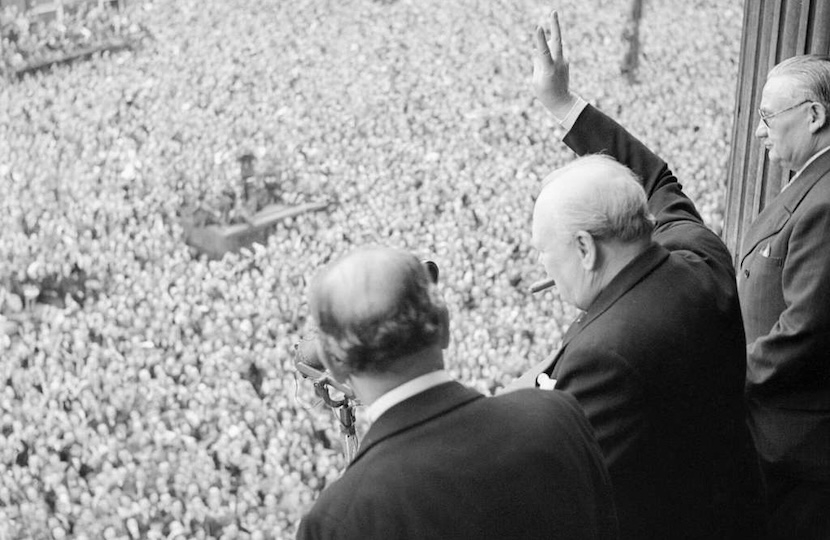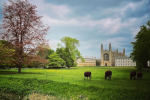
Alistair Lexden described the scene in the Commons sitting in the Lords chamber in the following article published in Parliament’s magazine The House on 6 May.
Vast crowds gathered outside the Houses of Parliament in the early afternoon. MPs met as usual at 2.15pm for oral questions, crowding on to the red benches in the Lords which they had occupied since the destruction of their own chamber in May 1941. The one hundred or so peers who attended with some regularity at that time fitted comfortably into the Royal Robing Room, where on VE Day they occupied themselves usefully by debating the Pontypool Gas Bill.
Churchill was due to make the short official announcement that the war in Europe had ended to the Commons immediately after broadcasting it from No 10 at 3pm, in an understandable departure from the convention, then strictly observed, that statements should be made first to Parliament.
MPs curbed their impatience admirably, as Harold Nicolson, a well-known writer who was then a National Labour MP on the government benches, noted when he arrived just after 3. In a letter later that day, he wrote: “Cool and hushed the Chamber was, with Grigg [the War Secretary] answering questions as if nothing unusual were impending.”
The scene was also keenly observed by the flamboyant gay diarist, ‘Chips’ Channon, Tory MP for Southend, who had arranged a place in the Speaker’s Gallery for his current lover, the playwright Terence Rattigan “looking so pretty.”
In the chamber, he recorded, “every seat was occupied. Churchill was expected at 3.15, but owing to the ovation he had in the streets he was delayed and for a few embarrassed minutes we had nothing to do! Members, amused, asked desultory questions about next week’s business as they glanced at the doors behind the Speaker’s Chair.”
Just before 3.30 the great man entered. In the Galleries visitors stood and clapped. Below, “everyone (except the recently elected cad for Chelmsford [Ernest Millington, a member of the small left-wing Common Wealth Party] ) rose and cheered him, and waved handkerchiefs and order papers.” Nicolson put it more simply: MPs “yelled and yelled.”
The most striking feature of Churchill’s statement was its praise for the Soviet Union. Stalin had wanted VE Day to be 9 May, and Churchill was anxious to propitiate him. He said: “Today, perhaps, we shall think mainly of ourselves. Tomorrow we shall pay particular tribute to our Russian comrades, whose prowess in the field has been one of the grand contributions to the general victory.”
Churchill, the great Parliamentarian, then spoke to his colleagues from the heart. Nicolson recorded: “When he had finished reading, he put his manuscript aside and with wide gestures thanked and blessed the House for all its noble support of him throughout these years.” Channon observed that “some members wept.”
Finally, Churchill turned to the Speaker to “beg, Sir, with your permission to move: ‘That this House do now attend at the Church of St. Margaret, Westminster, to give humble and reverent thanks to Almighty God for our deliverance from the threat of German domination.’ ” The words were those used by Lloyd George at the end of the First World War.
“We walked”, wrote Channon,” through St Stephen’s Hall and outside there was a terrific crowd; the sun was shining; there were bells; cameras clicked: police carved a way for our long procession of some five hundred MPs. We looked like a picture by Giovanni Bellini as we filed into St Margaret’s where there was a short and impressive service.” Channon pulled Rattigan into the procession, to the Government Chief Whip’s fury.
During the service the Speaker’s Chaplain read out the names of the twenty-one MPs who had been killed during the war. They included several gay friends of Nicolson, among them Barbara Cartland’s brother Ronnie. “The tears came into my eyes. Furtively I wiped them away. ‘Men are so emotional’, sniffed Nancy Astor, who was sitting next to me. Damn her.”
Members returned to the Lords chamber only to adjourn. As Churchill made his way through Central Lobby, a child dashed out from the crowd. “Please, sir, may I have your autograph? “The great man ruffled the boy’s hair as he returned the book. “ ‘That will remind you of a glorious day’, he said, and the crowd clapped louder than before.”
BIBLIOGRAPHY. Henry ‘ Chips’ Channon, The Diaries 1943-57. Edited by Simon Heffer (Hutchinson,2022). Faithful Witness: The confidential diaries of Alan Don, Chaplain to the King, the Archbishop and the Speaker, 1931-1946. Edited by Robert Beaken (SPCK, 2020). Martin Gilbert, Winston S. Churchill, Vol. VII: Road to Victory, 1941-1945 (Heineman,1986). Harold Nicolson, Diaries and Letters 1939-45. Edited by Nigel Nicolson (Collins, 1967). Victory: War Speeches by the Right Hon. Winston Churchill O.M., C.H., M.P., 1945. Edited by Charles Eade (Cassell, 1946).

